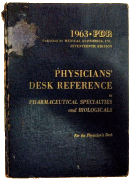 The Physicians Desk Reference [PDR] has grown since it was introduced in 1947, the year I started the first grade. It was still pretty thin when I started medical school in 1963, just a year after the Kefauver-Harris Drug Efficacy Act passed in the aftermath of the Thalidamide affair. The Act charged the FDA with certifying efficacy by at least two well conducted clinical trials in addition to its traditional safety evaluations.
The Physicians Desk Reference [PDR] has grown since it was introduced in 1947, the year I started the first grade. It was still pretty thin when I started medical school in 1963, just a year after the Kefauver-Harris Drug Efficacy Act passed in the aftermath of the Thalidamide affair. The Act charged the FDA with certifying efficacy by at least two well conducted clinical trials in addition to its traditional safety evaluations.  Then in the 1980s, again in response to pressure, this time from the HIV victims, there was a movement to publicly register Clinical Trials. Those efforts culminated in the FDA Modernization act of 1997 that created clinicaltrials.gov – a public registry. It was originally conceived as placing parentheses around a trial [a registration database up front and reporting database when completed], but only the registration actually caught on. The post-completion reporting database cupboard is bare, and has been, even in situations where reporting is mandatory within one year, like in government funded trials. They just didn’t do it. My accounting only covers high points, but it gives the flavor of how things have gone – a chess game that doesn’t seem to end. And a PDR that just keeps on growing – filling with drugs some of whose efficacy and safety have been exaggerated…
Then in the 1980s, again in response to pressure, this time from the HIV victims, there was a movement to publicly register Clinical Trials. Those efforts culminated in the FDA Modernization act of 1997 that created clinicaltrials.gov – a public registry. It was originally conceived as placing parentheses around a trial [a registration database up front and reporting database when completed], but only the registration actually caught on. The post-completion reporting database cupboard is bare, and has been, even in situations where reporting is mandatory within one year, like in government funded trials. They just didn’t do it. My accounting only covers high points, but it gives the flavor of how things have gone – a chess game that doesn’t seem to end. And a PDR that just keeps on growing – filling with drugs some of whose efficacy and safety have been exaggerated… 
by Ruijun Chen, Nihar R Desai, Joseph S Ross, Weiwei Zhang, Katherine H Chau, Brian Wayda, Karthik Murugiah, Daniel Y Lu, Amit Mittal, and Harlan M KrumholzBritish Medical Journal 2016 352:i637
Objective: To determine rates of publication and reporting of results within two years for all completed clinical trials registered in ClinicalTrials.gov across leading academic medical centers in the United States.Design: Cross sectional analysis.Setting: Academic medical centers in the United States.Participants: Academic medical centers with 40 or more completed interventional trials registered on ClinicalTrials.gov.Methods: Using the Aggregate Analysis of ClinicalTrials.gov database and manual review, we identified all interventional clinical trials registered on ClinicalTrials.gov with a primary completion date between October 2007 and September 2010 and with a lead investigator affiliated with an academic medical center.Main outcome measures: The proportion of trials that disseminated results, defined as publication or reporting of results on ClinicalTrials.gov, overall and within 24 months of study completion.Results: We identified 4347 interventional clinical trials across 51 academic medical centers. Among the trials, 1005 [23%] enrolled more than 100 patients, 1216 [28%] were double blind, and 2169 [50%] were phase II through IV. Overall, academic medical centers disseminated results for 2892 [66%] trials, with 1560 [35.9%] achieving this within 24 months of study completion. The proportion of clinical trials with results disseminated within 24 months of study completion ranged from 16.2% [6/37] to 55.3% [57/103] across academic medical centers. The proportion of clinical trials published within 24 months of study completion ranged from 10.8% [4/37] to 40.3% [31/77] across academic medical centers, whereas results reporting on ClinicalTrials.gov ranged from 1.6% [2/122] to 40.7% [72/177].Conclusions: Despite the ethical mandate and expressed values and mission of academic institutions, there is poor performance and noticeable variation in the dissemination of clinical trial results across leading academic medical centers.
|
Note: This is where I took a break, saw that Rexulti® ad, and had a severe attack of Apoplexy [un-****ng-believable!… and rexulti® in depression…]. Hopfully I’ll pick up where I left off…
|
«Randomized clinical trials are the ideal means for evaluating the efficacy and safety of a drug or device. Timely dissemination of the findings of clinical trials is not only essential to support evidence based decision making by patients and providers, but is required to fulfill the ethical obligation that investigators and sponsors have to study participants, professional values, and the mission of academic medical centers. Recent work has examined issues of data sharing more broadly, including the questions of which data would be made available, to whom, when, and under whose oversight. Our analysis represents the first systematic examination of the publication of clinical trials and reporting rates for results across academic centers. Though the Institute of Medicine, the National Institutes of Health, the European Medicines Agency, and the World Health Organization have helped spur the discussion about expanding the frontiers of data transparency, our findings suggest that far more basic elements of transparency in the clinical trial enterprise – the need to publish findings and report results – remain elusive.»
True enough the academic principle investigator might be involved in the protocol and the approval by the Institutional Review Board, But the Sponsor whose product is being tested is never far away. In most cases, the trial itself is conducted by Contract Research Organizations, some of which are associated with an academic institution though most aren’t. The study itself is often conducted in multiple clinical research centers and the data is processed and analyzed by the sponsor’s scientists and statisticians. The writing is provided by a contracted medical firm. The principle investigator is variably involved in some of that process, but likely more as adviser than any real head honcho.
There was a time in our lifetime when clinical trials were actually done solely by academic departments, but they were slow, not particularly interested, and couldn’t meet the demand. It was a way of supplementing the departmental income. But now, the academics are only important on the front end, and operate mainly as a spokesperson after publication if there’s a positive outcome. It’s still a revenue generating endeavor for the academic departments, but the PIs and authors act as a public face for an industrial effort. While I expect there is a lot of variability in the story as I describe it, we can’t really parse that from the outside.
 So as the world of drug testing has become increasingly distant from academic influence and control, why are the academic authors still involved? My guess is that they bring the aura of an academic standard and a medical ethic to the trials, and, of course, serve as a ticket into the traditional academic journals. To my mind, this meta-analysis is just further evidence that that influence is simply a mirage. There are many other more effective ways to insure that product testing is on the up and up. The academic community would be more usefully engaged in vetting the data that these trials produce, disconnected from the manufacturers.
So as the world of drug testing has become increasingly distant from academic influence and control, why are the academic authors still involved? My guess is that they bring the aura of an academic standard and a medical ethic to the trials, and, of course, serve as a ticket into the traditional academic journals. To my mind, this meta-analysis is just further evidence that that influence is simply a mirage. There are many other more effective ways to insure that product testing is on the up and up. The academic community would be more usefully engaged in vetting the data that these trials produce, disconnected from the manufacturers.
Sorry, the comment form is closed at this time.